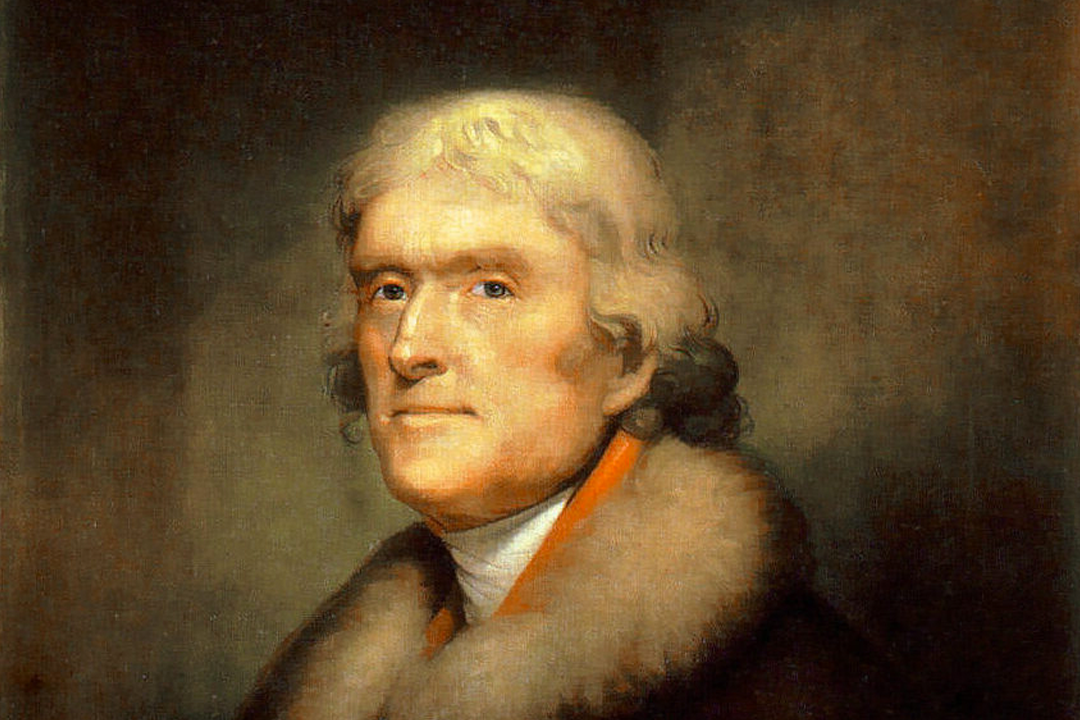On this day 247 years ago, the Second Continental Congress adopted the Declaration of Independence, officially declaring America's independence from the British crown and furthering a great struggle for separation that lasted more than six years and resulted in the creation of a new American republic.
But who was behind one of America's most important founding documents?
Thomas Jefferson was born on April 13, 1743, on a plantation in the Virginia Colony. His father, Peter, was a planter and surveyor who married into the prominent Randolph family. He died when Jefferson was 14 and left him 5,000 acres of land, where he would later construct his lifelong residence at Monticello.
Throughout his life, Jefferson would become a well-read classicist and collector of nearly 10,000 books, earn admission to the Virginia Bar, prove himself as an accomplished political philosopher, serve in the Virginian legislature, work as an ambassador to France, receive an appointment by President George Washington to serve as the first Secretary of State, win an election as Vice President under President John Adams and later win two consecutive elections as President himself.
But Jefferson held none of these accomplishments so dearly as to include them on his tombstone. Instead, he listed these:
"Author of the Declaration of American Independence, of the Statute of Virginia for religious freedom and Father of the University of Virginia."
Jefferson was only 33 years old when he was tasked with drafting the document that would formally declare the secession of the American states from the British Empire in 1776. At the time, he served as one of the youngest delegates to the Second Continental Congress. War had erupted between the colonies and British troops in 1775.
President of Hillsdale College Dr. Larry Arnn spoke to the circumstances surrounding the declaration in an episode of "Our American Stories" in 2020:
"[The Declaration of Independence] is written in an atmosphere of a threat of execution. There is a warrant out for the arrest of everyone who signed that document. And the warrant is not given to a lawful civil officer. It is given to a general. He is told to use his army and find these men."
Though Jefferson was a slaveholder, his writings spoke to a belief in Natural Law and individual liberty. As a young attorney, he represented freedom-seeking slaves in seven different cases and pursued reforms to slavery in the Virginia House of Burgesses. Hence, the beginning of the second paragraph of the Declaration:
"We hold these truths to be self-evident, that all men are created equal, that they are endowed by their Creator with certain unalienable Rights, that among these are Life, Liberty and the pursuit of Happiness.--That to secure these rights, Governments are instituted among Men, deriving their just powers from the consent of the governed, --That whenever any Form of Government becomes destructive of these ends, it is the Right of the People to alter or to abolish it, and to institute new Government, laying its foundation on such principles and organizing its powers in such form, as to them shall seem most likely to effect their Safety and Happiness."
"[The Declaration of Independence] begins universally and abstractly," explained Arnn. "… It's an act of obedience to a law that exists beyond the English law, beyond any law that they might make."
According to Arnn, congressional leaders chose Jefferson to write the Declaration of Independence because they knew his writing talent.
Congress appointed Jefferson to the Committee of Five alongside Adams, Benjamin Franklin, Robert R. Livingston and Roger Sherman. He was the only Southerner on the committee tasked with creating the formal decree, but under the persuasion of Adams, the committee tasked Jefferson with drafting most of the document itself.
He did this in 17 days, mostly writing in isolation in the house he was renting in Philadelphia. Jefferson presented the final document to Congress on Friday, June 28, 1776. Congress began debate on Monday and removed a fourth of Jefferson's original draft, including a passage critical of King George III's importation of slaves to the American colonies.
Congress ratified what was left of Jefferson's Declaration on July 4, 1776. From that point on, the American states were sovereign.
The states came out of the War for Independence victorious over six years later, on September 3, 1783, upon the signing of the Treaty of Paris. The states operated under a loose confederation for four years under the Articles of Confederation before the adoption of the new U.S. Constitution in 1787.
Jefferson and his fellow antifederalists advocated for the adoption of limits on the new federal government through the Bill of Rights in 1791.
This formally restricted the federal government from infringing on free speech, the practice of religion, the press, protest, free assembly and the right to bear arms, required it by law to uphold due process and trial by jury and abstain from unreasonable searches and seizures and cruel and unusual punishments and promised state's rights and other individual liberties.
Jefferson died exactly 50 years after the ratification of the Declaration on July 4, 1826.
To connect with the author of this story or to comment, email will.blakely@1819news.com or find him on Twitter and Facebook.
Don't miss out! Subscribe to our newsletter and get our top stories every weekday morning.










